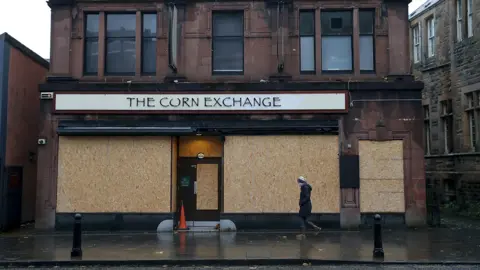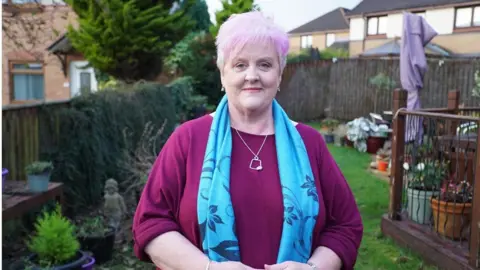Covid in Scotland: 'I found myself pouring a glass of wine at 2pm'
 BBC
BBCFor years Susan struggled with alcohol, drinking up to three bottles of wine a day and hiding the evidence.
Three years ago, the 45-year-old managed to get her drinking under control but 2020 has been "tricky".
The Covid pandemic and the lockdown from the end of March meant she lost both of her jobs, one at an airport, the other in a hotel.
A college course was suspended and when her partner returned to work Susan, not her real name, found herself "stuck at home," struggling to home-school her son, resentful and worried about money.
"It was really stressful," she told BBC Scotland's The Nine.
"I found myself pouring a glass of wine at two o'clock in the afternoon."
For someone with a history of problem-drinking "it was like playing a game of roulette".
Susan is far from alone.
One charity told us it had seen an 80% rise in people contacting its drug and alcohol abuse helpline.
Scottish Families Affected by Alcohol and Drugs said 1,680 people had asked for help between March and November, up from 935 in the same period last year.
Families of people with addiction problems accounted for 34% of the increase while there was a 244% jump in contacts from people using substances themselves - from 177 to 609.
The charity said this was possibly because many were struggling to access any other support services.
"We've just had this sort of pressure cooker situation," said Scottish Families chief executive Justina Murray.
"The 'Stay at Home, Stay Safe' message doesn't really apply to everybody," she told The Nine, "because where there's substance use in the home it's really a place of increased risk and increased harm."
Other experts agreed that the pandemic, and the restrictions from government, had pushed more people into alcoholism.
Lockdown was "hugely damaging" for Scotland, said Kirsty Mulcahy, who runs Sober Buzz, an online community for people who want to stop drinking.
Ms Mulcahy said she was aware of many drinkers who had struggled under the "immense" pressures of the pandemic. There would be others, she added, who were too embarrassed or ashamed to seek help.
"More therapists, more counsellors and more support groups" must be part of the answer, suggested Ms Mulcahy.
As well as people struggling with addiction themselves, their families have also suffered this year.
'Knot in my stomach'
Kate (not her real name) is in her late 70s with a son who has battled alcoholism for much of his adult life.
"This year brought everything to a head," she told me in the frosty garden of her home in the west of Scotland.
It was a bone-chilling day with a blanket of freezing fog but we were unable to meet indoors because of restrictions imposed to try to prevent the spread of the coronavirus.
Kate said her son had been cooped up alone in a flat in a different part of the country, leaving his family unable to see how badly his health was deteriorating.
"Even on Zoom calls we couldn't understand how much he was losing weight," Kate said.
For several days in August she was unable to contact him at all.
"Every time he didn't answer the phone there was a knot in my stomach," she said. "It was like being put on a rack. You just got more and more stretched with anxiety."
It turned out Kate's son had, as she feared, been drinking heavily again, switching from wine to beer and cider. He ended up in hospital, his organs failing.
"It was nearly the end, another 24 hours and he would have gone," she said.
Around this time Kate herself was taken to hospital by ambulance with a stress-induced illness.
She said: "The addict lives in their own chaos but we as family members get sucked into that chaos."
According to Kate, support from a counsellor with the Scottish Families charity was "a lifeline".
 PA Media
PA MediaThe charity, which receives funding from a variety of sources including the Scottish government, gives help that includes virtual group meetings with other family members as well as activities such as online educational courses.
According to psychotherapist Angela Trainer, the trauma, fear and anxiety which many people have experienced this year has led to a rise in food, alcohol and drug addictions, both legal and illegal, across Scotland.
"We were looking at the effects of shock," said Ms Trainer, director of the Harvest Clinic, a therapy centre in Glasgow.
A lasting mental health crisis is "inevitable", she said, adding "there will need to be some kind of mopping up process for people who have been left with a legacy of addiction or anxiety or fear".
"I think we are going to be craving each other's company. I think we're going to be craving physical contact: the kiss, the touch, the hug, and we're going to appreciate each other far more," she added.

For Fiona Mackay, a PR consultant based in Old Kilpatrick in West Dunbartonshire, this has been a year of video calls - for business and pleasure - lubricated by alcohol.
"We don't have the pubs open and we don't have people pouring the right measures and we don't have people watching what we do. So the overseers are not there. They're all gone," she said.
"Is that the norm that we really want?"
"Government has reached into our lives in a very big way," reasoned Ms Mackay, and to cope with the intrusion: "I think we self-medicate... and drinking is part of that."
In a statement, the Scottish government said: "We are keen to understand the impact of Covid-19 and lockdown on a range of health behaviours including alcohol consumption.
"We know these are worrying and uncertain times for many people. During the pandemic and beyond we would encourage people to find other ways to 'clear their head' to help cope with stress."
Ms Mackay said: "It's been very difficult and there are a lot of issues around how we cope that I hope don't turn into chronic conditions."
Kate knows all about the chronic condition that is alcoholism.
She said: "You live in hope that every day your beloved addict is going to turn a corner, that this will be the day that makes the difference - but lockdown has made that day further away."
And Susan insists she is coping, even though it is tough.
"Some days I've got to go hour by hour," she explained. "I've got to think 'right just don't drink until three o'clock.' And then when I get to three I'll think 'right try and go to four o'clock'.
"Hour by hour, just to stay sober," she said.
